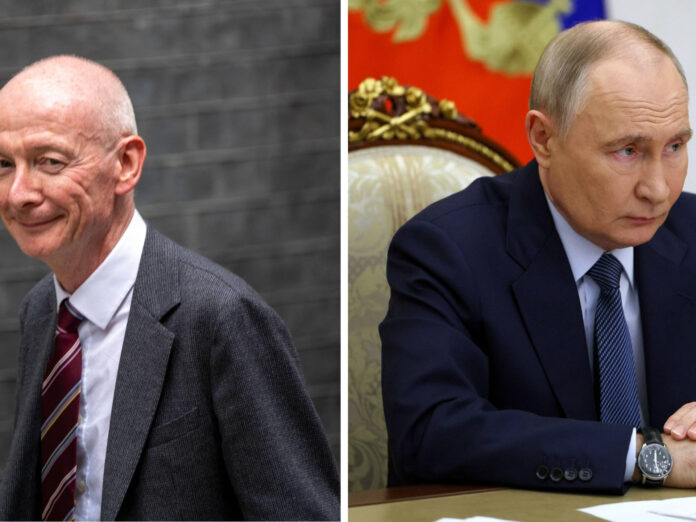Russia’s Hidden Cyber War Against the West
The United Kingdom has issued a stark warning about the escalating threat of Russian cyberattacks targeting NATO countries, including the UK, in an effort to undermine Western support for Ukraine. Pat McFadden, the Chancellor of the Duchy of Lancaster, is set to deliver this warning during his speech at the NATO Cyber Defence Conference in London next week. McFadden will highlight the severity of the cyber threat posed by Moscow, emphasizing that these attacks form part of a “hidden war” being waged alongside Russia’s military campaign in Ukraine.
“Military hard-power is one thing, but cyber war can be destabilizing and debilitating,” McFadden is expected to say. He will underline the devastating impact cyberattacks can have, such as shutting down power grids and disrupting the lives of millions. The minister will stress that Russia’s cyber tactics are a critical aspect of its broader strategy, targeting not only government and military networks but also private businesses and critical infrastructure across NATO nations.
State-Backed Hackers and Rogue Cyber Groups
In his speech, McFadden will spotlight the role of Russia’s military intelligence unit, Unit 29155, which has been implicated in numerous cyberattacks across Europe, including the UK. He will also warn about the growing threat posed by unofficial groups of “hacktivists” and cyber mercenaries operating with the Kremlin’s tacit approval. While these groups are not officially controlled by the Russian government, they align their activities with Russia’s geopolitical goals, effectively extending the Kremlin’s cyber reach.
“The threat is real,” McFadden will assert, describing Russia’s approach to cyber warfare as both aggressive and reckless. He will point to recent incidents, such as a cyberattack on South Korea attributed to a pro-Kremlin hacking group, as evidence of Russia’s willingness to breach international boundaries and exploit global tensions. The South Korean attack followed its monitoring of North Korean troop movements in the Russian border region of Kursk, demonstrating how Russian-aligned hackers are emboldened to act beyond their immediate sphere of influence.
McFadden will caution that a single miscalculation by such groups could have catastrophic consequences, not only for targeted countries but also for global stability. He will emphasize that Russia’s cyber operations are not confined to high-profile government and military targets but extend to critical infrastructure and private enterprises. “Russia won’t think twice about targeting British businesses in pursuit of its malign goals,” he will warn.

Bolstering Cyber Defenses: A Shared Responsibility
The UK minister’s remarks also reflect growing concerns about the vulnerabilities of British businesses to cyber threats. McFadden will call on business leaders to proactively enhance their digital defenses, stressing that the security of civilian organizations is integral to national security. “Their security is our security,” he will assert, urging firms to adopt robust cybersecurity measures capable of thwarting potential Russian cyberattacks.
The UK government is also stepping up its own efforts to strengthen national defenses against cyber threats. McFadden is expected to outline initiatives aimed at enhancing the country’s resilience, including increased collaboration with NATO allies. These measures will focus on intelligence sharing, coordinated response strategies, and bolstering critical infrastructure against potential attacks.
“We must not underestimate the scale of the cyber threat we face,” McFadden will say. He will stress that Russia’s cyber operations represent a clear and present danger to Western nations and call for a unified response to counteract this growing menace.

Coordinated NATO Response to Emerging Cyber Threats
The minister will also underscore the importance of NATO’s collective efforts to combat emerging cyber threats. Enhanced coordination among member states, he will argue, is essential to mitigating the risks posed by Russia’s sophisticated cyber capabilities. McFadden will highlight the alliance’s role in sharing best practices, streamlining response mechanisms, and improving overall resilience against cyberattacks.
NATO’s Cyber Defence Conference serves as a platform for member states to assess vulnerabilities, exchange intelligence, and develop strategies to counter cyber threats. McFadden’s remarks are expected to galvanize support for a comprehensive, collaborative approach to addressing Russia’s cyber aggression.
As cyberattacks become an increasingly prominent weapon in modern conflict, the UK’s warning serves as a stark reminder of the urgent need to strengthen digital defenses. Russia’s cyber strategy, which blends state-backed operations with rogue elements, represents a significant threat not only to Ukraine and its allies but also to global stability.
By urging businesses, governments, and NATO allies to take proactive measures, McFadden aims to ensure that the UK and its partners are prepared to counteract this hidden war. In the face of an evolving cyber landscape, collective vigilance and resilience will be key to safeguarding national security and maintaining international peace.

